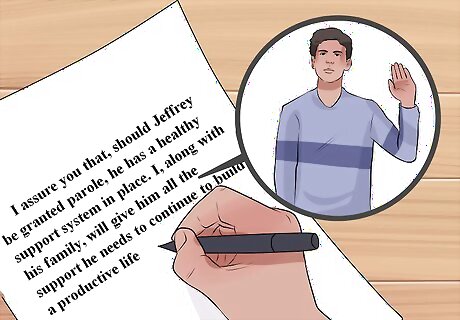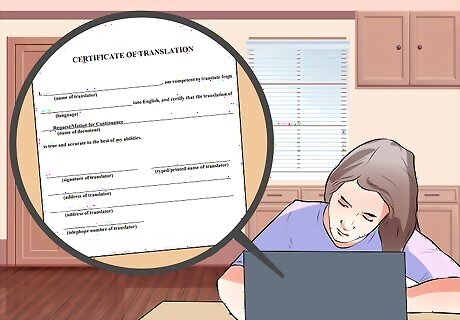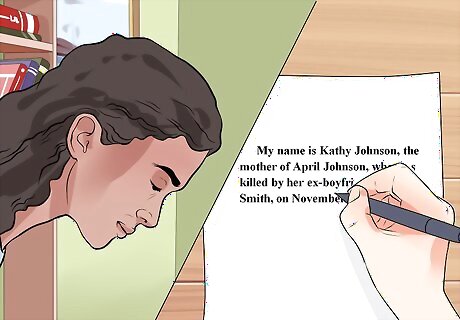
views
Writing a Letter as the Offender

Understand what you must say. Offenders write letters in support of their own parole for a variety of reasons. One common reason is that the inmate fears getting nervous at the hearing or doesn’t express himself well orally. If this is the case, then you should write a letter. Parole boards are looking for offenders to say certain things in their letters: Take responsibility. You can’t plead your innocence or try to minimize your role in the crime. Express remorse. You must express heartfelt sorrow at the pain you have caused the victim and the victim’s family. Explain how you have changed. Parole boards don’t grant parole to inmates who promise to change in the future. Instead, you need to explain how you have changed your life while in prison. Describe your future. The parole board wants to see that you have realistic, concrete plans for leading a productive life outside of prison.

Search for templates. You can try to find sample letters written by other inmates. You can ask your lawyer if he or she has examples you can read. There are also templates on the Internet, however these are not usually real letters. Even if you find a sample to use, remember that you must write the letter yourself. You should not have the lawyer draft it for you to sign. Instead you want the letter to feel genuine.

Open a word processing document. You should type the letter instead of writing it by hand. A typed letter is more professional and will be easier to read. Set the font to a readable size. Times New Roman 12 point font is fairly standard. You should adjust it if you find you can’t read font that small.

Insert the date. At the top of the page you should insert the date on which you are writing the letter. Two lines beneath the date you should type in the address of the parole board. This information should all be included in the packet of information you have received from the parole board. Two lines beneath the address, include your salutation: “Dear Parole Board”.

Begin by identifying yourself. In the first paragraph, you should state your name and your prison identification number. Also specify the date of your parole hearing. For example: “My name is Jeffrey Smith, and I am writing in support of my application for parole. My hearing date is April 22, 2016 and my identification number is 12345.”

Describe the crime and your role in it. In the second paragraph, you will need to explain the crime you committed. You should be sufficiently detailed so that the parole board does not think you are shirking responsibility for the crime. For example, you should write “I shot the gun” instead of “the gun went off.” You should write “I stabbed him three times in the back” not “we got into a fight and I defended myself by stabbing him a couple times.” You also shouldn’t complain about the quality of your attorney or that the judge was biased. Also don’t try to blame the crime on drugs or alcohol (although you should certainly state if you were high or drunk during the crime).

Express remorse. In the third paragraph you need to express remorse for the crime and the pain you caused the victim and the victim’s family. You may need to spend some time thinking over this paragraph. Often, it is difficult for people to put into words their sorrow at what they have done. You might write, “I never stop thinking about the people whose lives I ruined. That is guilt that I will have to live with for the rest of my life. At night I pray that the family has managed to rebuild their lives. When I pray, I feel sorrow for the pain I have caused them. If I could go back in time and not commit the crime, I would.”

List the steps you took to reform yourself. In the fourth paragraph, explain how you have managed to rehabilitate yourself. Mention specific things: religion, earning a degree while in prison, meeting a mentor, etc. Do not simply assert that you have changed; instead, describe the process. A short summary might read, “When I came to jail I had a seventh grade education and no interest in learning about anything or anyone else. The first year I was sent to work in the library. Bored, I sometimes leafed through magazines but realized I could barely read what was written in them. At that point, I decided to try to earn my high school diploma….” Then you can describe how education opened your mind and helped you confront the reality of your crime.

Describe your future and how you will achieve it. In order to grant parole, the board wants to see that you have thought out your future. A promise to keep your nose clean is pretty empty unless you can point to specific steps that you will take once released. You could write, “I have a support system in place for when I get out. My job, at the Stop and Top, is waiting for me. I am confident that I will do a good job as I have managed to get several commendations for the work I have done around the prison. I also have a rental available, which is close enough to my job that I will be able to walk to work. It is also close to my parents, who will stop in to visit me once a week just as they have while I have been in prison.”

Conclude the letter. End the letter by promising the parole board that you will not commit more crimes once released. Unless they are convinced that you will stay crime-free, they will see little reason to release you back into the general population. “If given parole, I can promise the board that I will make the most of my opportunity and not re-offend. I now have the tools to build a meaningful life for me and my family.”

Include your signature. Write “Thank you for reading this letter” and then move down a couple lines to insert “Sincerely.” Sign using a pen.
Writing a Letter in Support of Parole

Inquire as to why you were asked. Generally, offenders request letters from people who can show the parole board that he or she has a support system waiting outside the prison. This support system typically includes family, friends, faith leaders, counselors, and employers. Feel free to ask the offender or his attorney why you were selected to write the letter and if there is anything that you should include in the letter.

Outline what to say. Before writing the letter, you will probably find it helpful to sit down and think about the points that you want to make. Writing them down in bullet point format will help you remember to touch on everything as you draft your letter.

Get the deadline. Ask the offender when the letter needs to be submitted. Some offenders will want all letters submitted to the parole board before a certain date. However, the offender may find it beneficial to have letters submitted throughout the year. This will signal that the offender’s support is continuous and substantial.

Use letterhead. If you are writing in support because you are an employer, then you should use company letterhead. If you are an employer but do not have letterhead, then you should have the letter notarized. All others can print off their letter on regular paper. However, if you are a business owner or a professional who has letterhead, then you can certainly use it for your own letter.

Identify yourself and the inmate. In the first paragraph, you should identify who you are and also who the inmate is. Be sure to identify the inmate by name and prison identification number. If you do not know this number, then ask the inmate. Sample language could be: “My name is Melissa Jones. I am the former employer of Jeffrey Smith, who is an inmate in your prison. His inmate number is 12345. I request that you grant him parole at his hearing, which has been scheduled for April 22, 2016.”

Explain why you support parole. In the second paragraph, you should explain the reasons you support the inmate receiving parole. Use your own language. For example, you might support parole because you are the inmate’s spouse and you and your children need the inmate back in your lives. You could write, “As I have visited Jeffrey with the children over the past two years, he has never failed to express remorse for what he did. When talking to the children, he asks them many questions about whether they are following the rules at school, and he always reminds them how important it is to listen to their teachers. The children need this fatherly presence at home.” If you are offering a home to the offender, then you will need to include particular information: the address, phone number, whether the home is rented or owned, and the names of other people in the home. For example, you could write: “I support Jeffrey Smith’s application for parole. As his first-cousin, I have offered him an apartment to rent. The apartment is in an apartment building that I own at 1212 Rockwell Road, Abilene, Texas. He will pay $450 a month in rent. The phone number to his unit is XXX-XXXX. My personal number is….” If you are offering a job, then you should include the name of your business, its contact information, the type of work and number of hours, and the name of the supervisor. Sample language could include, “I have offered Jeffrey a job at my grocery store, Stop and Top, located at 445 Smithson Street, Jonesport, Maine. Our number is XXX-XXXX. The job is a full-time, 40-hour a week position unloading trucks and shelving goods. I will serve as his direct supervisor.”

Conclude by pledging support for the offender. You need to end the letter in a way that gives the parole board confidence that the offender will not commit more crimes if released. You could say, “I assure you that, should Jeffrey be granted parole, he has a healthy support system in place. I, along with his family, will give him all the support he needs to continue to build a productive life.”

Have the letter translated. If you are not confident writing in English, then you should write the letter in your native language and then get it translated. Make sure that the translation is done by a professional and not a family member. You should attach a letter of translation. This letter will be signed by the translator, often in front of a notary public. A sample certificate of translation is available at http://www.justice.gov/sites/default/files/eoir/legacy/2013/09/30/certoftranslation.pdf.

Mail the letter. You should send the letter to the parole board or to the offender’s attorney. Ask the inmate who you should send it to. Some state parole boards have an online system you can use for submitting letters. New York, for example, has one such system. New York’s system, however, severely limits the length of any letter and might be best used by members of the general public. If the offender has requested that you write the letter specifically, then you should still print off a hard copy letter and submit it.
Writing a Letter in Opposition to Parole

Think about testifying instead. If you were the victim of the crime, then you might want to write a letter opposing parole. You can certainly do so. Nevertheless, you should give some thought to actually going to the parole hearing and testifying in person. Live testimony can be much more dramatic—and effective. Letters can be “distancing”; that is, they obscure the human costs of the crime. Your heartfelt testimony in person will bring home how damaging the offender’s crime has been. Not everyone can deliver a live statement. However, in certain situations, the victim of the crime can often deliver a victim impact statement in person. You should check with the parole board to see who can testify in person, if this is an option that interests you.

Introduce yourself. If you choose to write a letter, then you should identify who you are and your relationship to the victim. For example, “My name is Kathy Johnson, the mother of April Johnson, who was killed by her ex-boyfriend, Jeffrey Smith, on November 15, 1999. Jeffrey Smith is coming up for parole this April, and I am writing this letter to explain why I oppose his petition for parole.”

Offer your version of the crime. If you are the victim of the crime, then you can explain what happened. If you are a family member of the victim, then you can offer your own summary of the crime based on what you heard at trial. Be as graphic as you need to be. You want the parole board to be outraged by the crime.

Describe the victim. You should make sure that the parole board has a strong image of the victim in their mind as they are considering whether to grant an offender parole. If the inmate killed the victim, then only you can speak for him or her. Describe the victim so that the parole board has a sense of the life that the victim snuffed out. Be detailed. You want to make the victim seem like a living, breathing person. Explain his or her hobbies, hopes for the future, and achievements.

Explain the impact the crime has had on you. You should also explain to the parole board the toll the crime has taken on you physically and emotionally. For example, a rape victim might write, “I wish I could say that the pain I felt ended when he finished raping me. But I have suffered emotionally and physically for a long time since then. I have been in counseling for several years and have difficulty maintaining a healthy body weight, problems directly attributable to the sexual assault.”

Point out why you think the offender is not rehabilitated. You should also bring to the parole board’s attention any facts that show the offender has not really rehabilitated himself. Cast doubt on the offender’s claim that he has turned his life around. You might write: “Though I am sure that Jeffrey is claiming to be a changed man, I seriously doubt that he has learned anything at all. Only last year, he gave an interview to the local paper where he tried to minimize his role in the crime. He also couldn’t even say my daughter’s name.” You also may have received threatening letters or phone calls from the inmate. If so, the parole board needs to know this information as well.

Request that parole be denied. You should close the letter with a powerful request that the inmate be denied parole. Talk about the fear his or her release would create. “For months after my daughter’s death, I was unable to sleep. The fact that Jeffrey was locked up provided little comfort. If he is released out of prison, then I am sure that all of the old nightmares will return. I can only hope that you will deny him parole so that another mother will not have to suffer what I have gone through over the past several years.”

















Comments
0 comment